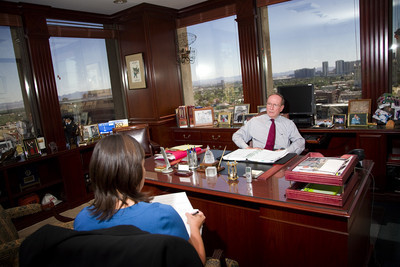Legal community continues to shrink
Perhaps a crystal ball is needed to try to figure out where the economy is headed next, but local attorneys are taking their own stab at predicting the future of the legal community: Cost cutting is likely to continue, billable hours may wane in popularity and lawyers could earn less this year and next.
Gone are the days, at least for now, of law conglomerates coming into Las Vegas and throwing cash at local firms to induce a merger. That very recent era of opulence will be replaced by more downsizing and frugality. A client going into one of the newer, no-frills startup law offices may be directed to a stack of Dixie cups and the water cooler rather than receiving a brand-name beverage.
The upside is often lower rates. A storefront location with few trimmings often translates into fewer fees than a palatial business suite filled with expensive fixtures. Law firms will have to analyze their clients' priorities and particular tastes, said Mark Tratos, managing partner of Greenberg Traurig. His Las Vegas office of the national firm reflects upscale tastes in decor and artwork.
"One strategy is to be lean and mean, no decor, and you operate by keeping costs down," he said. "The other attitude is the very top end. Clients expect you to meet them in the lobby with coffee in a cup."
Neal Klegerman, whose firm Coppedge Emmel & Klegerman was formed last month by three former Kummer Kaempfer Bonner Renshaw & Ferrario attorneys, knows all about minimalism. His new firm on Fort Apache Road was opened using a sparse 1,600 square feet in an office park, with only three lawyers and no support staff.
Getting rid of the "legacy" or overhead costs allows Klegerman to charge less than large law firms, he said.
"We are for people who want high-quality legal services but don't want to pay for a cup of latté or all the fancy trappings."
The long-held practice of billable hours is expected to give way to an increased number of negotiated fee agreements. Law firms are already starting to compete by offering alternatives to traditional billing, said Paul Hejmanowski, the managing partner of Lionel Sawyer & Collins.
"I think you will see real pressure on billable hours. It will decline as a way to measure the cost of service," he said. "There will be real pressure on (driving) downward rates."
Lionel Sawyer & Collins, which typically raises rates annually, has frozen its fees this year. Santoro Driggs Walch Kearney Holley & Thompson didn't freeze rates but opted for a small rate increase, said Ron Thompson, the firm's managing partner. But any rate increase at this point may be counter to the trend.
"A lot of firms have frozen rates at this point," Thompson said.
Tratos expects more "blended hours," when multiple lawyers from one firm work on a case. The highest-paid of those attorneys will often reduce their hourly rates. The popularity of flat fees is also expected to rise. Hejmanowski and Tratos both see "pay what it is worth" arrangements gaining in popularity.
"You will see a reduced hourly rate but a guaranteed bonus based on success," Tratos said.
Reductions in force have not stopped, but are unlikely to again reach the level of Kummer Kaempfer Bonner Renshaw & Ferrario's 16 layoffs -- including nine attorney cuts -- in March, many attorneys said. The next round of law firm reductions in force, or RIFs, may affect some unlikely people.
"If the market trends continue, I would expect that they would go after the higher-paid lawyers," said Dennis Kennedy, a founding shareholder in Bailey Kennedy. "You can't just keep cutting the low-paid associates from the bottom. Those are the people who generate money."
Although Kennedy doesn't expect to see law firms having to change their names because the founding partners have been shown the door, he predicts some well-known lawyers will be looking for work soon if the economy doesn't improve.
More cuts are likely, others agreed.
"I think we'll see more layoffs," Hejmanowski said. "I think there are some law firms that are not done downsizing."
A lawyer's average annual billing is now expected to be about 1,800 hours, but that is likely to jump to 2,000 hours as firms try to do more with less. Green associate hires will be put on hold, leading to more work for everyone else, Kennedy predicted.
Firms will be reluctant to dole out bonuses to attorneys, as clients increasingly are demanding one-price deals, he added.
"As the profession changes, we are seeing more clients want flat rates, and we are willing to discuss that," Kennedy said.
Bonuses are not the only thing to go by the wayside: Greenberg Traurig has reduced associates' salaries in some other parts of the country. More law firms are rumored to have also followed that trend, although Tratos said his associates' salaries in Las Vegas haven't been impacted.
Las Vegas associates could be hit in the pocketbook soon, said John Mowbray, Fennemore Craig's local managing partner. "I've heard everyone is taking a hard look at that, and (at) a freeze on current salaries."
"Our market is following the national market, not leading," said Mike Bonner, former managing partner of Kummer Kaempfer Bonner Renshaw & Ferrario. "Salary increases may be slow, and a lot of law firms may want to reduce fixed operating costs."
Bonner does see some light at the end of the tunnel.
"I think we are hitting bottom now," he said.
Contact reporter Valerie Miller at vmiller @lvbusinesspress.com or 702-387-5286.

















